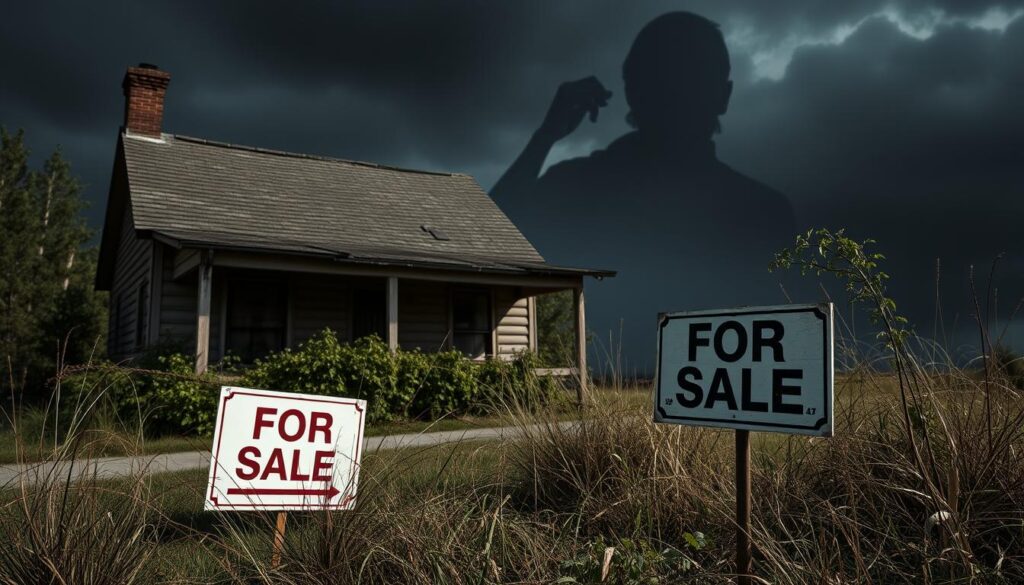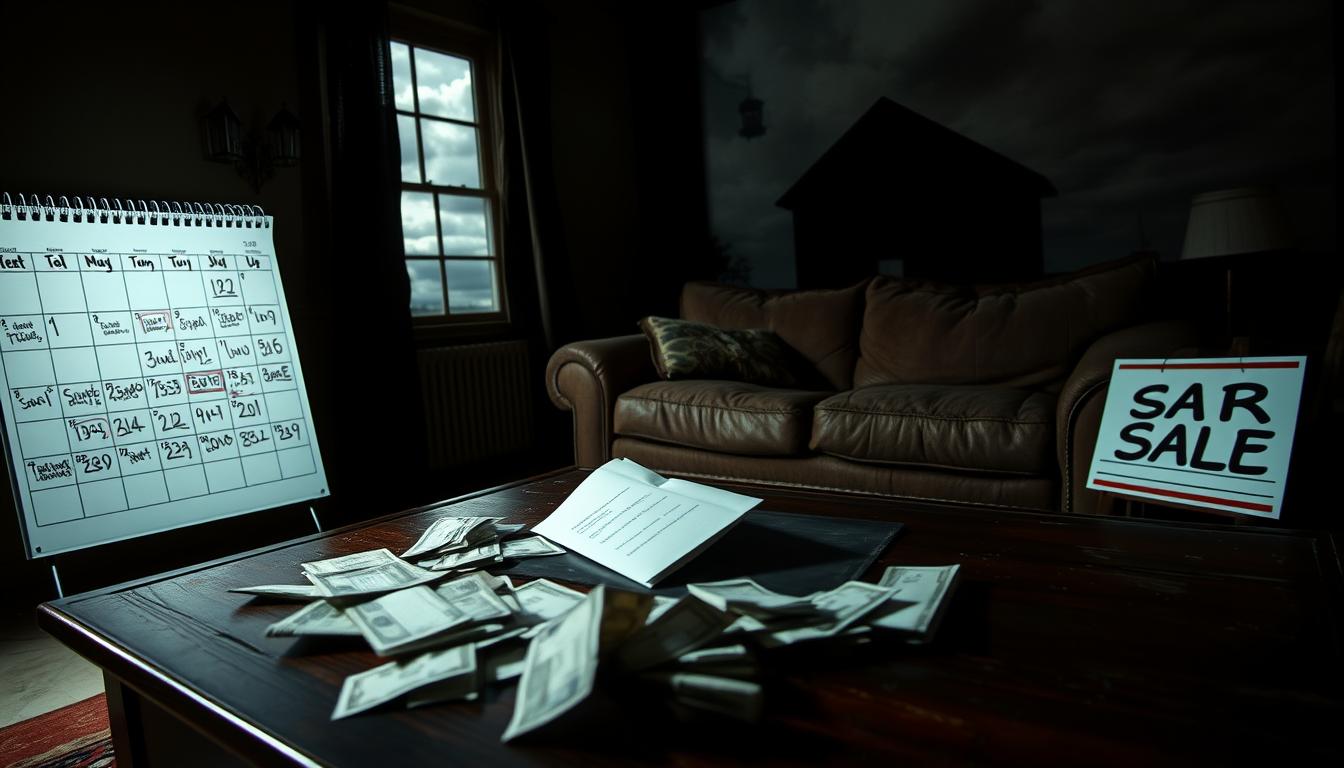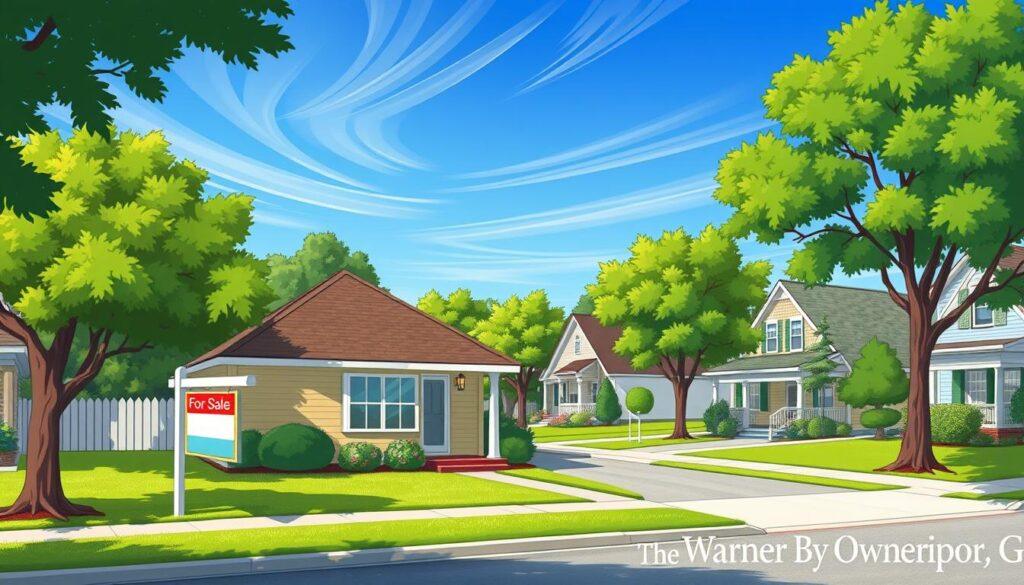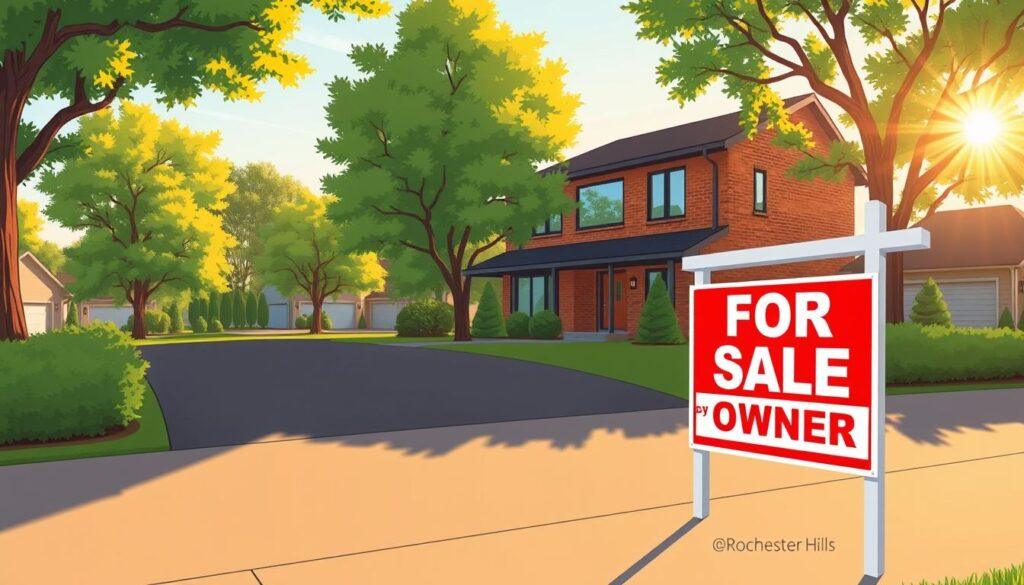Ever wondered what happens if you miss a mortgage payment? It’s more than just a financial problem. Defaulting on a mortgage can lead to serious consequences that affect your finances for years. It’s important to know the impact of missing mortgage payments.
This article will explain the effects of defaulting on a mortgage. We’ll cover immediate and long-term impacts. We’ll also talk about the importance of talking to your lender early on.
Key Takeaways
- Defaulting on a mortgage can lead to acceleration of debt and foreclosure.
- The waiting period for a conventional loan after foreclosure is typically 7 years.
- Homeowners have options like loan modifications to adjust payment terms.
- A deed in lieu of foreclosure can reduce the waiting period for future loans to 4 years.
- Forbearance agreements can help pause payments temporarily, but repayment is required.
- Timely communication with lenders is essential to avoid severe consequences.
- Understanding your options, such as short sales or foreclosure prevention programs, can provide pathways to resolve financial distress.
Understanding Mortgage Default
Mortgage default is a big problem for homeowners. It happens when they miss payments. But, missing one payment doesn’t mean you’re in default right away. Knowing why defaults happen can help you avoid them.
Definition of Mortgage Default
Default means a borrower can’t meet their mortgage agreement. This usually happens when they miss payments. Experts say saving three to six months’ living expenses can help avoid default.
When you get a default notice, you have 30 to 120 days to fix it. If not, foreclosure might start.
Common Causes of Default
Many things can lead to default. Life’s unexpected events are a big reason. Here are some common causes:
- Job loss
- Unexpected medical expenses
- Divorce or separation
- Not keeping up with mortgage terms, like insurance or taxes
Ignoring a default notice is very risky. It can lead to losing your home. Late payments can hurt your credit score too. For help, talk to a real estate attorney who knows about foreclosures. For more info, check out our website.
What Happens When You Default On A Mortgage?
Defaulting on a mortgage can cause serious problems, both right away and in the long run. Knowing what happens first can help borrowers get ready. Right away, you might get a notice of default from your lender. This is a formal warning after missing payments.
This notice can cause a lot of stress and uncertainty. Sometimes, lenders might ask for the full amount of the mortgage. This adds more pressure on borrowers who are already struggling financially.
Immediate Consequences
When you default on a mortgage, you face several challenges:
- Notice of Default: This document shows you’ve missed payments and could lead to foreclosure.
- Increased Financial Stress: The growing debt can make you feel more anxious and unsure about your home.
- Debt Acceleration: Lenders might ask for the full mortgage balance, forcing you to find a big sum of money fast.

Long-term Implications for Your Finances
Defaulting on a mortgage also has long-term effects on your finances:
- Credit Score Damage: Defaults can stay on your credit report for up to six years, hurting your score and future borrowing chances.
- Higher Interest Rates: With a bad credit history, you might get loans with higher interest rates, leading to bigger monthly payments.
- Access to Credit: You might find it harder to get approved for future mortgages. Lenders might see past defaults as a risk, asking for bigger deposits.
By taking steps early, like refinancing or talking to housing counselors, you can lessen these long-term effects. Being honest about your financial situation might help lenders offer more flexible payment plans. This could prevent them from starting foreclosure proceedings.
Mortgage Default Consequences
Defaulting on a mortgage has serious effects on a borrower’s finances. It leads to the acceleration of debt and legal actions, especially foreclosure.
Acceleration of Debt
When a borrower defaults, lenders can speed up the loan repayment. This usually happens after missing about four payments. They send a notice of default after 90 days of missed payments, giving a 30-day chance to catch up.
If the borrower doesn’t respond in time, the lender demands the full loan balance. This is to recover the debt.
Legal Actions: Foreclosure Process
The foreclosure process starts when a borrower can’t make mortgage payments. States have different ways to handle this, with some needing court and others not.
Judicial foreclosures take longer, often needing court action. Non-judicial foreclosures are quicker, finishing in less than 120 days after default.
If a property sells for less than the mortgage balance, borrowers might face a deficiency balance. This can lead to more legal trouble and hurt their credit score.
| Foreclosure Type | Description | Typical Timeline |
|---|---|---|
| Judicial Foreclosure | Involves court proceedings; can prolong the process. | Can take several months to over a year. |
| Non-Judicial Foreclosure | Does not involve court; generally quicker. | Approximately 60 to 120 days. |

How Loan Default Impacts Your Credit Score
Defaulting on a mortgage can severely harm your credit score. It’s important to understand the loan default impact if you’re facing financial trouble. When you miss payments, credit bureaus are notified, causing your score to drop immediately.
The effects of mortgage default are not just short-term. They can last for years, making it hard to recover financially.
Immediate Effects on Credit Score
When a payment is 30 days late, it’s reported to credit bureaus. This can lower your credit score right away. Missing just one mortgage payment can have big consequences.
As delinquency grows, your credit score will drop further. This can make it tough to get back on track financially.
Long-term Credit Challenges
Defaulting on a mortgage can affect your credit for up to seven years. This period brings many challenges, including:
- Difficulty qualifying for new loans.
- Increased interest rates on future financing.
- Struggles to secure credit cards or other forms of credit.
- Potential impact on rental applications and job opportunities.
The effects of mortgage default can deeply impact your financial health. To overcome these challenges, consider seeking help from credit counselors or working on your budget. Understanding the long-term loan default impact helps you better manage your finances.
| Loan Type | Default Timeframe | Consequences |
|---|---|---|
| Mortgage | 30 days | Credit score decrease, potential foreclosure. |
| Auto Loan | 30 days | Repossession and credit score impact. |
| Personal Loan | 30 days | Collateral seizure and credit damage. |
| Credit Card | 180 days | Account closure and collection efforts. |
| Federal Student Loan | 270 days | Wage garnishment and credit impact. |
Mortgage Delinquency Effects
Understanding the journey from mortgage delinquency to foreclosure is key. It shows the tough times homeowners face. The path from default to foreclosure is long and affects both money and mental health.
When a borrower misses a payment, they start down a hard road. This can lead to serious consequences.
Timeline of Default to Foreclosure
The first missed payment starts the timeline. After 30 days, the lender sends a reminder. Then, after 90 days, a formal notice of default is sent.
Foreclosure can start 90 to 180 days after default, depending on the state. There are ways to avoid foreclosure, like forbearance or selling the house.
Emotional and Psychological Impact
Mortgage delinquency can be very stressful. Homeowners worry about losing their home. This stress can change their life and relationships.
It’s important to talk to lenders early. This can help reduce stress. Support from loved ones or professionals is also crucial during tough times.
Steps to Avoid Mortgage Default
It’s key to know how to avoid mortgage default to keep your finances stable. Talking openly with your lender is the first step. This way, you can look into different plans to avoid losing your home.
Communication with Your Lender
When money troubles hit, it’s crucial to reach out to your lender right away. Early contact can lead to finding solutions. These might include:
- Loan modifications to adjust your payment terms
- Forbearance agreements allowing you to temporarily pause payments
- Repayment plans to catch up on past due amounts
Keeping up with payments is vital once a plan is set. Working with your lender can stop foreclosure. Knowing your rights and the mortgage terms is also key. Always understand what you’re agreeing to before signing.
Financial Planning and Budgeting Tips
Good financial planning is key to avoiding mortgage default. Here are some tips:
- Set a realistic budget: Check your income and expenses regularly to stay within your budget.
- Borrow conservatively: Don’t take out more than you need for a home. This keeps your mortgage debt manageable.
- Act quickly: If you miss a payment, act fast to catch up. This can stop things from getting worse.
Responding quickly is very important. Selling your home for cash can also help if you’re struggling financially. Companies like New Again Houses can help you sell quickly. This way, you can avoid foreclosure and get back on track financially.
Being proactive with your lender and planning your finances well can lower the risk of default. Quick actions and clear talks with your lender are key. They help you keep your home and stay financially healthy.
Conclusion
Knowing the effects of mortgage default is key to keeping your finances stable. The consequences can be harsh, like hurting your credit score and facing foreclosure. But, you can lower these risks by acting early.
By talking to your lender on time and managing your money wisely, you can avoid default. This is a big step towards keeping your home.
If mortgage troubles come up, looking for help is crucial. HUD counselors and companies like Pierre Home Buyers can guide you. They offer solutions to sell your home fast or change your loan to avoid default.
For more information, check out our detailed article on mortgage management and default prevention. Learning about your financial duties helps you make better choices. It leads to a brighter financial future.






